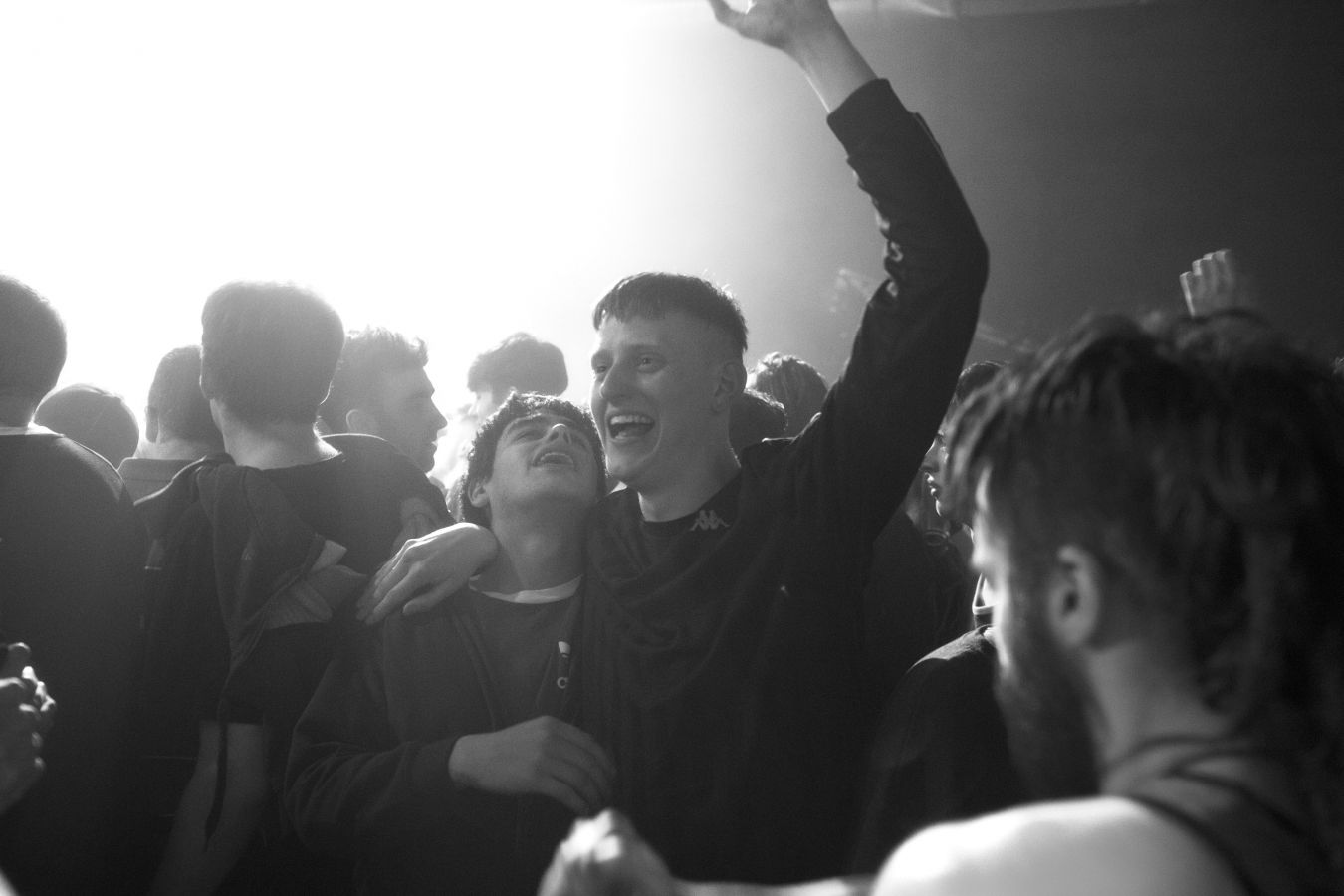What exactly are Johnno and Spanner? There are moments when the two Scottish teens hate each other’s guts with bilious fervor, others when they’re the “dream team and that,” inseparable and co-dependent best friends à la Diego Luna and Gael Garcia Bernal in Y Tu Mamá También, others still when their bromance veers into an uncharted, emotionally complex terrain. Brian Welsh’s rollicking Beats thrives on these ambiguities, on a greater-than-life friendship between an introvert and his volcanic and beguilingly ruffian neighbor as they brace for a night out that’s likely to be their last–or at any rate, the last rave their central Scotland turf may ever host.
Based on a 2012 play by Keiran Hurley (here credited as co-script writer next to Welsh), Beats thrums with an unbridled energy that owes less to the massive party it culminates with than to the poignant relationship between the two characters who head into it. The year is 1994, TV commercials promise new car and real estate projects, Labour’s new leader Tony Blair rails against the country’s “culture of drugs and urban squalor,” a discourse that predates the Criminal Justice and Order Bill, a new law set to ban all unlicensed public gatherings “characterized by the emissions of a succession of repetitive beats.” Scotland’s rave scene is collapsing, as is the world around Johnno (Cristian Ortega). His policeman stepfather Robert (Brian Ferguson) has convinced his mum (Laura Fraser) to settle in a nicer stretch of suburbia–“happy-clappy plastic land”, as Spanner (Lorn Macdonald) aptly titles it–a decision that will spell the end of the duo’s long-time friendship, and the days spent listening with religious fervor to the techno hits spat out of a local pirate radio helmed by DJ D-Man (Ross Mann), a dreadlocked combo between American Graffiti’s Wolfman Jack and Philip Seymour Hoffman’s Count in The Boat That Rocked).
“Rave to the Grave!” D-Man bellows from his mic, calling for all local partygoers to defy the new restrictions, assemble their crews, and head to a nearby warehouse for one last night of epic raging. It’s tantalizing paean Johnno and Spanner can only hear from afar, and if Beats bursts with such contagious adrenaline, credit goes to Welsh and Hurley for portraying the underground scene as a viciously fascinating Wonderland stashed with eccentrics and dangers–and to Ortega and Macdonald for plunging into it with the kind of awed reverence you’d expect from two teenage boys suddenly faced with an adults-only world of cheap thrills and taboos. Slack-jawed and eyes furrowed in a look of perpetual horror, Ortega graces Johnno with an instantly relatable what-am-I-doing-here fear, but it is Macdonald the scene stealer here, stupefying in his ability to undergird every bombastic display of swagger with a touching vulnerability.
There are drugs, stolen kisses, entrancing tunes, and hypnotizing dances, but much like everyone around Johnno and Spanner is keen to warn them that “this is not just a rave,” Beats is not just a party film. Hardcore raving and teenage angst teem with ferocious sociopolitical anger. D-Man may well speak in ecstasy-fuelled tongues for a good half of his screen time, but some of his radio tirades against the cops and Blair’s New Labour belie a critique of all-pervasive mechanisms of surveillance with a curious Foucauldian echo (“to be noted is to be registered,” he rants on the radio, before railing against the government’s attempts at privatizing people’s lives). And if the way Johnno’s mom and stepdad shun Spanner as “scum” feels particularly unjust, it is because Welsh shows a perceptive eye for the class differences the two boys’ friendship reckons with, but never truly breaks down. The prospect of a looming move may well shake Johnno’s world to the core, but what are we to expect of Spanner’s? Ostensibly parentless and bullied by his savagely aggressive older brother Fido (Neil Leiper), the boy is the reflection of the humiliating circumstances he’s been raised in, and the great tragedy behind the selfless love that binds Johnno to him (“he’s the smartest guy you’ll ever meet“ he describes him to a girl, “I’m really just a coward next to him”) is that the world Spanner is mired in has already pushed him at its margins–and both boys are unmistakably aware of it.
Shot in gorgeous black and white by Ben Kracun and thrumming to the score put together by Glasgow icon DJ Twitch (one half of duo Optimo, here working with a whole array of contemporary hits, from The Prodigy to Detroit’s Belleville Three), Beats percolates with the bittersweet sadness of faded postcard, a relic from an irretrievable time that concurrently moves to tears and chuckles. It’s engrossing, to the point of turning into an achingly nostalgic madeleine; watching Johnny and Spanner make their way to the party is to be jolted back to a time of messiness and uncertainties, an idyllic if long-gone era when night-outs were greater-than-life, age-defining landmarks. “It’s a scene that’s been done before anyways,” a worried Spanner mutters next to Johnno, hopelessly fishing for a good excuse not to join a horde of ravers shuffling past them. It’s true, and we’ve been here before, too. With its wise DJs, sibling rivalries, children-parent feuds, bromances broken and rescued, hallucinogenic substances of various shapes and rapacious kisses, Beats tips its hat to a long school of coming-of-age classics, from George Lucas’ American Graffiti to Richard Linklater’s Dazed and Confused–but finds its own, entrancing voice. Watching the two best friends twirl in a crowd of hundreds, their eyes agleam with unfettered happiness, I was a teenager conjured for. Rave on.
Beats screened at the International Rotterdam Film Festival.

